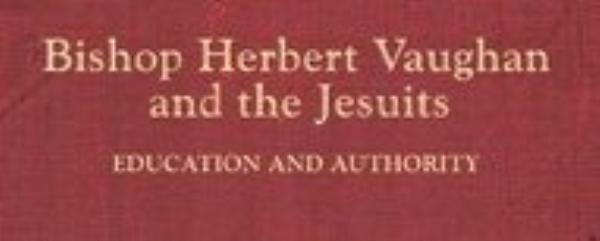English Jesuits threatened with loss of faculties and suspension a divinis? The English Province as ‘altogether abnormal, dangerous to themselves, mischievous to the Church in England’? Bishop Vaughan a bully? Vaughan, another Bismarck intent on the persecution of Jesuits? The provincial, Peter Gallwey, ‘impetuous, imprudent, full of piety, work and mortification, but impetuous. Ah, he’s Irish, he lacks calm a little’? Former provincial, Alfred Weld, ‘too refined’? Father General, Peter Beckx, ‘haughty’? We are reminded yet again ‘verba volant, scripta manent’ as we read the documents collected here. The conflict between Bishop Vaughan and the English province became so acrimonious that Pope Pius IX admitted, ‘this business of the Jesuits is a real mess.’
A very distinct, post-Reformation Catholic historiographical tradition considers the presence of the Society of Jesus in England more a liability than an asset. Its proponents believe that Jesuit political activity so antagonised a suspicious government that it reacted with severe penal legislation; Catholics suffered persecution as a result. Moreover, according to this tradition, Jesuits placed the good of their order before that of the mission. A clear indication of Jesuit priorities is their siphoning off for the Society the best students at the English colleges. This accusation, as old as the Society’s work in the British Isles, recurs often in this collection. Historians Charles Dodd, Joseph Berington and Mark Tierney, among others, reflect this hostility between secular clergy and religious. To them, Jesuits are free-wheeling mavericks, armed with papal privileges and dispensations, de facto and de iure opposed to an episcopal structure that restricts or impedes their activity. They would concur totally with a comment allegedly made by John McQuaid, 19th century Bishop of Rochester, New York (after whom, ironically, the Jesuit high school in Rochester is named), that Jesuits were ‘papal presbyterians’. Herbert Vaughan, despite his education at Stonyhurst and his younger brother, Bernard’s fame as a Jesuit preacher at Farm Street, viewed the Society from this perspective. Working as a stalking horse for his patron, Manning in 1875, Vaughan insisted that the Society of Jesus within his diocese of Salford follow his agenda and not its own. The issue was the establishment of a Jesuit college in Manchester. Did the province have the right to do so? The provincial, Peter Gallwey believed it did, citing the bull that re-established the Society in 1814 and decrees from the Sacred Congregation for the Propagation of the Faith (Propaganda Fide) in his support. Vaughan, on the other hand, claimed the province needed his approval, which he refused to grant, and that the Jesuits were in violation of an earlier concord. Ecclesiastical intrigues in the corridors of the Jesuit curia (then based in Fiesole) and in the Vatican resulted in the defeat of the Jesuits. The province was even denied a face-saving exit. Vaughan rejected the ‘spin’ that the college’s closure was for ‘reasons of peace,’ as Father General Peter Beckx suggested, because that explanation portrayed Vaughan as a disturber of the peace. The bishop insisted it was a question of justice. The decision left Jesuits ‘more downhearted than I [Vaughan] thought possible’ (p. 188). Vaughan may have won the battle (and the hierarchy, the war), but did he have a good case?
Other historians, most recently Oliver Rafferty SJ, who argues that the Jesuits were clearly in the wrong, have analysed and discussed the conflict (‘The Jesuit College in Manchester, 1875,’ Recusant History 20 [1990], 291-305). In this nicely edited collection of pertinent correspondence, Vaughan’s Roman journal, and miscellaneous memorials, Martin John Broadley, a priest of Salford diocese, presents both sides of the disagreement. In the introduction, the editor situates the conflict clearly within the traditional secular/Jesuit struggle. But given Vaughan’s (and Manning’s) insistence on episcopal rights, one wonders how he handled the other religious orders and congregations within his diocese. Did he single out the Jesuits? Or can one find comparable struggles played out less conspicuously with other men and women?
As in most collections of documents, there is repetition, but all documents fascinate as each side argues its case in Rome with the assistance of not-always-dependable curial allies. At times the anger is barely controlled. The quarrel served as a catalyst for the promulgation in 1881of Romanos Pontifices, Pope Leo XIII’s definition of relations between bishops and religious orders in England, Wales and Scotland. Eventually extended to other counties, Romanos Pontifices remained the norm until the promulgation of the Code of Canon Law in 1917. Of the two headstrong protagonists, Vaughan succeeded Manning as Archbishop of Westminster in 1892 and was made a cardinal in 1893; Gallwey served only one term as provincial, 1873-1876. In his journal, Vaughan summarised a conversation with Allesandro Cardinal Franchi, prefect of Propaganda Fide on 26 May 1875 in which the cardinal asked whether the general had the power to remove a provincial. Vaughan thought that he had the authority and suggested that his removal would be the best solution. Does this explain Gallwey’s short provincialate? Vaughan concluded his Roman journal with the observation: ‘It is current in Rome that Pius VII used to say of S.J. 1) they are very good but necessary to keep under; 2) they form a fine picture but a frame is required’ (p. 194). Vaughan (and Manning) made sure the frame fitted tightly.
The reviewer, Thomas M. McCoog SJ, is the Archivist of the British Province of the Society of Jesus.






